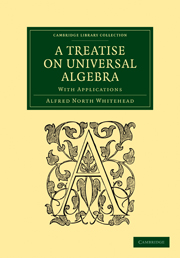Book contents
- Frontmatter
- PREFACE
- Contents
- BOOK I PRINCIPLES OF ALGEBRAIC SYMBOLISM
- CHAPTER I ON THE NATURE OF A CALCULUS
- CHAPTER II MANIFOLDS
- CHAPTER III PRINCIPLES OF UNIVERSAL ALGEBRA
- BOOK II THE ALGEBRA OF SYMBOLIC LOGIC
- BOOK III POSITIONAL MANIFOLDS
- BOOK IV CALCULUS OF EXTENSION
- BOOK V EXTENSIVE MANIFOLDS OF THREE DIMENSIONS
- BOOK VI THEORY OF METRICS
- BOOK VII APPLICATION OF THE CALCULUS OF EXTENSION TO GEOMETRY
- Index
CHAPTER III - PRINCIPLES OF UNIVERSAL ALGEBRA
Published online by Cambridge University Press: 29 August 2010
- Frontmatter
- PREFACE
- Contents
- BOOK I PRINCIPLES OF ALGEBRAIC SYMBOLISM
- CHAPTER I ON THE NATURE OF A CALCULUS
- CHAPTER II MANIFOLDS
- CHAPTER III PRINCIPLES OF UNIVERSAL ALGEBRA
- BOOK II THE ALGEBRA OF SYMBOLIC LOGIC
- BOOK III POSITIONAL MANIFOLDS
- BOOK IV CALCULUS OF EXTENSION
- BOOK V EXTENSIVE MANIFOLDS OF THREE DIMENSIONS
- BOOK VI THEORY OF METRICS
- BOOK VII APPLICATION OF THE CALCULUS OF EXTENSION TO GEOMETRY
- Index
Summary
Introductory. Universal Algebra is the name applied to that calculus which symbolizes general operations, defined later, which are called Addition and Multiplication. There are certain general definitions which hold for any process of addition and others which hold for any process of multiplication. These are the general principles of any branch of Universal Algebra. These principles, which are few in number, will be considered in the present chapter. But beyond these general definitions there are other special definitions which define special kinds of addition or of multiplication. The development and comparison of these special kinds of addition or of multiplication form special branches of Universal Algebra. Each such branch will be called a special algebraic calculus, or more shortly, a special algebra, and the more important branches will be given distinguishing names. Ordinary algebra will, when there is no risk of confusion, be called simply algebra: but when confusion may arise, the term ordinary will be prefixed.
Equivalence. It has been explained in § 3 that the idea of equivalence requires special definition for any subject-matter to which it is applied. The definitions of the processes of addition and multiplication do carry with them this required definition of equivalence as it occurs in the field of Universal Algebra. One general definition holds both for addition and multiplication, and thus through the whole field of Universal Algebra. This definition may be framed thus: In any algebraic calculus only one recognized type of equivalence exists.
- Type
- Chapter
- Information
- A Treatise on Universal AlgebraWith Applications, pp. 18 - 32Publisher: Cambridge University PressPrint publication year: 2009First published in: 1898

